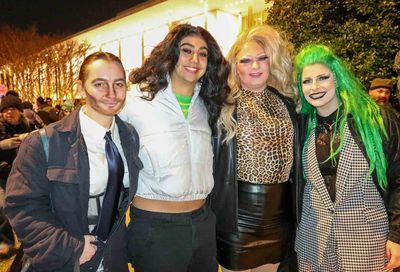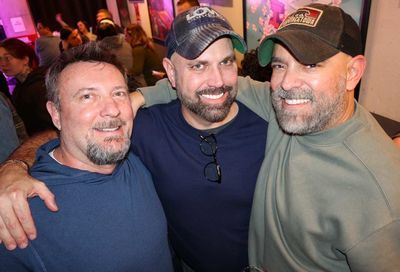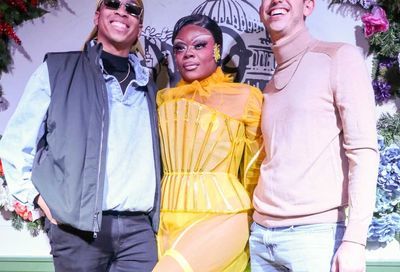HRC Under Fire
A question as old as Stonewall returns in the months since Californians passed Proposition 8
When it comes to laying blame for a lack of progress on LGBT equality, activists aren’t just focusing on President Barack Obama and Congress. They’re also focusing their ire on the Human Rights Campaign, an organization whose budget, staff and prominence dwarves that of other national LGBT groups.
The criticism, although valid on some points, is more timeless than it is unique – though technology might have placed a thumb on the activists’ side of the scale in this most recent weighing of the sides.
Let there be no doubt, HRC President Joe Solmonese came under fire at Michelangelo Signorile’s ”LGBT Leadership Town Hall” event on April 22, due in part to the rather stacked, small studio audience that included several activists from Get Equal, the group that has been most vocal in its criticism of movement leaders. Asked by Signorile if he would commit to ”publicly pressur[ing] the White House” to take action in support of getting ”Don’t Ask, Don’t Tell” repeal language included in the defense authorization bill this year, Solmonese simply said, ”Yes.”
But when asked if he would resign if DADT repeal didn’t happen this year or if the ENDA is not passed, Solmonese responded that his employment ”is a matter between me and the board [of directors of HRC], and that’s how it’s gonna stay.” Though accurate, the response was not, to put it mildly, helpful.
Asked if HRC would support a May 2 rally urging the White House to include DADT repeal in its Defense Department budget bill that it submits to Congress, Solmonese – stuck in London because of the volcanic ash that disrupted European air travel and participating in the town hall courtesy of the BBC – said that was the first he’d heard of the rally. Even if true, Solmonese’s tepid response only encouraged the growing disdain that his organization has engendered in Get Equal’s activist base.
That liberal activists are not thrilled with HRC is nothing new. Having interned at HRC in 1998 and attended New York City Pride when HRC had endorsed then-Sen. Alfonse D’Amato (R-N.Y.) over then-Rep. Charles Schumer (D-N.Y.), I have seen far worse than the reactions people had to Solmonese’s responses this past week.
What’s more, this is a debate within the LGBT community that has been around since as far back as the Stonewall riots, if not earlier.
In July 1969, in the days following the riots outside of the Stonewall Inn, writer Edmund White wrote to two friends of what had gone on those nights that are credited with starting the fire that became the movement for LGBT equality.
White wrote of the ”kids [who] were all shooed into the street,” the ”drag queen [who was] shoved into the wagon” and ”[s]ome adorable butch hustler boy [who] pull[ed] up a parking meter, mind you, out of the pavement.”
But White also wrote of another group.
”Dreary middle-class East Side queens,” he wrote, ”st[ood] around disapproving but fascinated, unable to go home, as though torn between their class loyalties, their desire to be respectable, and their longing for freedom.”
While I don’t think anyone has called Solmonese dreary, the questions about class loyalties and desire for respectability remain. And the nationalization of the LGBT movement made it more difficult for White’s ”kids” to play the same role in the decades after Stonewall.
However, when Proposition 8 mobilized a new generation of activists, the advent of online activism changed their ability to go around HRC in pursuit of their goals.
For example, the Servicemembers Legal Defense Network has begun a new campaign, sharing a daily letter sent to the White House by a person impacted by the military’s ban on openly gay service. Most of the leading LGBT blogs are joining SLDN in this effort, publicizing the letters on their sites.
These technology changes, though, are not going to eliminate the relationships that HRC has fostered or stature it has maintained in Washington, a role that gives the organization the ability to work with the White House on issues like the hospital-visitation memorandum that Obama issued earlier this month.
And unless and until there is some other organization or group waiting in the wings, it’s difficult to see how LGBT equality advances successfully without HRC. As even Get Equal’s Robin McGehee told me in March about their first set of actions, ”Our goal is not to be the person who gets to be in those negotiations.
”It’s to be able to get Joe [Solmonese] and Rea [Carey of the National Gay and Lesbian Task Force] and Mara [Keisling of the National Center for Transgender Equality] into those meetings where they can … use the political capital they’ve gotten to pressure” leaders.
And, with increased pressure from people like McGehee and others, perhaps Solmonese’s ”longing for freedom” will weigh more heavily on him in the coming weeks as DADT repeal and ENDA’s passage lay in the balance.
Chris Geidner is the senior political writer for Metro Weekly. He can be reached at .
Support Metro Weekly’s Journalism
These are challenging times for news organizations. And yet it’s crucial we stay active and provide vital resources and information to both our local readers and the world. So won’t you please take a moment and consider supporting Metro Weekly with a membership? For as little as $5 a month, you can help ensure Metro Weekly magazine and MetroWeekly.com remain free, viable resources as we provide the best, most diverse, culturally-resonant LGBTQ coverage in both the D.C. region and around the world. Memberships come with exclusive perks and discounts, your own personal digital delivery of each week’s magazine (and an archive), access to our Member's Lounge when it launches this fall, and exclusive members-only items like Metro Weekly Membership Mugs and Tote Bags! Check out all our membership levels here and please join us today!






















